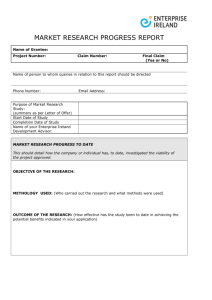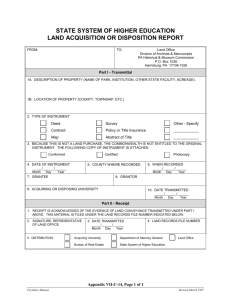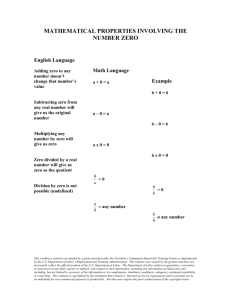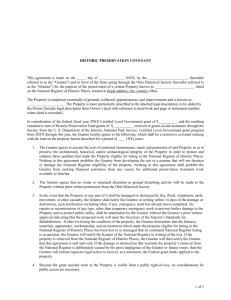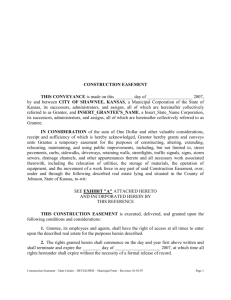Untitled
advertisement
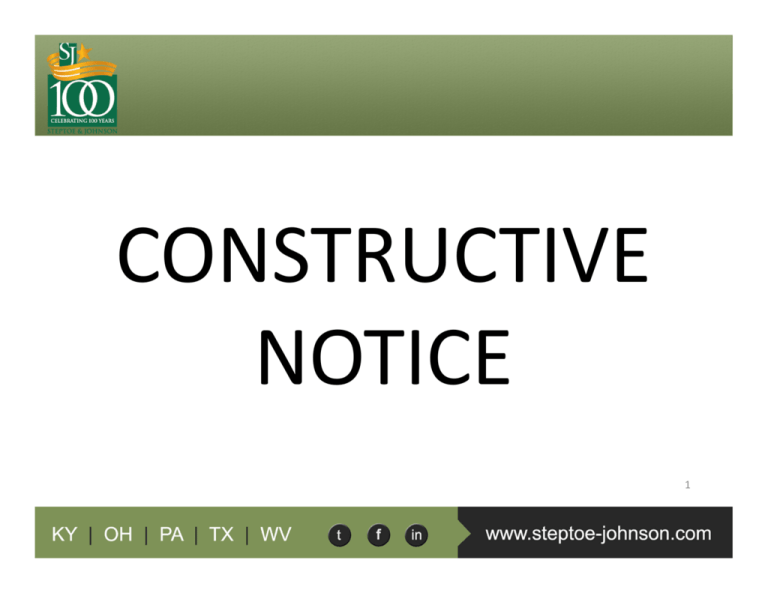
CONSTRUCTIVE NOTICE 1 The first common law rule was “first in time is first in right”, illustrated as: (time of conveyance) 1 O -------------------------------- A (time of recording) UR 2 O -------------------------------- B UR 2 Some principles originally contained in the earliest recording statutes that are still important: 1. An instrument is fully operative between its parties without recordation; 2. The essential features of a transaction are made a matter of public record; 3. Acknowledgment of an instrument is required for recordation; and 4. If a first purchaser is negligent and does not record, the grantor can divest him of title by making a second conveyance. 3 Benefits of the Recording Statutes: 1. They benefit the first purchaser because the first purchaser can verify that he is first from prior recording. 2. They benefit the seller because they assure the seller he can receive fair market value for his conveyance because he can confirm his ownership. CONFIDENCE 4 A “purchaser” is a person who pays present consideration to acquire an interest in land from the present owner, such as: 1. The buyer of the legal title 2. A mortgagee or other creditor 3. An assignee of a mortgagee or a person with a legal interest 4. The buyer at an execution or other forced sale, if he pays consideration in addition to crediting his lien against the property. 5 Some States provide that the following persons are not recognized as “purchasers”: 1. 2. 3. 4. 5. 6. Donees Heirs and devisees Creditors - sometimes Assignees for the benefit of creditors Persons who have a filed a lis pendens Mortgagees, where the consideration was a preexisting debt. 6 Additional parties most Courts do not classify as “purchasers” are: 1. Grantee of a stranger to record title. 2. A person claiming through an unrecorded conveyance. 3. Owners of equitable interests, such as: a. Heirs of a spouse b. Resulting and constructive trusts c. Mortgage in form of a deed absolute d. Adverse possession 7 All states require that to establish the affirmative defense of being a bona fide subsequent purchaser (BFP) the party must prove: 1. Payment of a valuable consideration 2. Good faith (no intent to take an unfair advantage of a third person) 3. The absence of notice, either actual or constructive, of the rights of third parties 4. Timely recording. The states differ as to placing the burden of proof on either the first purchaser or the second purchaser. 8 The Types of Recording Statutes are: 1. Race statute – gives priority to the first grantee to record. The concept of “notice” is not an issue. 2. Notice statute – gives priority to the grantee who acquires without notice of a prior transfer. 3. Race Notice statute – gives priority to the grantee who acquires without notice, but only if that grantee records first. 9 The Race Statutes Representative States – Arkansas and Louisiana In these states, recording is the final act in transferring title and recording is the determining factor in resolving a dispute between conflicting parties. The exceptions are: 1. 2. Subsequent purchasers cannot use fraud or delay the recording of the earlier instrument. The title of a purchaser or mortgagee is subject to any prior interest identified in the conveyance to him. 10 The Notice Statutes Representative States – Kansas, New Mexico, Texas and West Virginia The “notice” type statute grants priority to a subsequent purchaser only if he, at the time of delivery, has no notice of the prior conveyance. The statute protects a subsequent purchaser who takes without notice whether or not the first/prior purchaser ever records. 11 The Race-Notice Statutes Representative States – Arkansas, California, Colorado, Michigan, Montana, North Dakota, New York, Ohio, Oklahoma, Pennsylvania, Utah, West Virginia and Wyoming In a race-notice state the priority is given to the first purchaser who records without notice of the prior conveyance. The Courts have not consistently interpreted the different statutes so that the effective rule in a state may not be consistent with the statute. Also, commentators and practitioners differ on how they categorize the states. See the Smart Chart – Exhibit B. 12 Some property interests are not in writing and thus not subject to the penalty of the recording statutes. These property interests usually arise as an operation of law, not by agreement of the parties: 1. 2. 3. 4. 5. 6. 7. 8. Adverse possession Community property interest of a spouse who is not a prior grantee. Resulting and constructive trusts Title by descent Easement by prescription or easement by necessity Vendor’s lien Other equitable liens Right of reformation or rescission. Most of the interests above are considered equitable interests, but 1, 4, and 5 are legal. 13 There are some types of instruments that do not receive the benefit of either the recording statutes or the equitable doctrine of BFP. The following instruments are either void or voidable: 1. 2. 3. 4. 5. Forgery Mistaken identity Agent without authority (ancient document rule) Minority Incapacity 14 Constructive Notice Constructive Notice is imposed as a matter of law from: 1. 2. Proper recording Actual possession In every state except for Colorado, an instrument must be properly acknowledged to be recordable. In most states, the filing fee is a condition to proper filing. In some states the mailing address of the grantee is a requirement, but not a condition, to proper filing. In most states an instrument provides constructive notice from the moment it is properly filed. In other words, actual recording of the instrument in the record books is not required. 15 Indices – Tract or Grantor-Grantee Most states require the following information in their index: 1. Type of instrument 2. Date of instrument and date filed/recorded 3. Volume and page or other reference 4. Parties 5. Land covered Problems – Grantor-Grantee Indices. 16 Chain of Title Definition – Successive conveyances commencing with the patent from the government down to and including the conveyance to the present owner referencing the land in question. A purchaser or creditor is usually not charged with notice of the following: 1. 2. 3. 4. 5. Instruments executed by a stranger to title. Instruments affecting other property. Instruments executed by grantor but recorded before Grantor acquired title. Instruments executed by grantee of a prior unrecorded instrument Subsequent conveyances or encumbrances by immediate grantor or mortgagor. The “Chain of Title Rule” is that purchasers and creditors are on notice only of those instruments within the chain of title, as defined in each state, affecting the lands in question. 17 Scope of Search – Two Theories 1. 2. Narrow scope of search – from the day of the deed to each grantor (some states would say the day this deed is recorded) to the day the deed from that grantor to a grantee is recorded. Broad scope of search – a purchaser or creditor must examine all deeds given by all prior record owners. In states utilizing a tract index, a broad scope of search is possible/practical. A broad scope of search is impractical in states utilizing a grantor-grantee index system. As a practical matter, abstract-title companies only maintain tract indices so most examinations are performed utilizing a narrow search method, regardless of the state’s requirement. 18 Constructive Notice From Properly Recorded Instruments Imposes Upon the Purchaser or Creditor knowledge of: 1. 2. 3. The terms, recitals, stipulations and conditions of the instrument All facts disclosed by the acknowledgment of the instrument; and The legal effect of the instrument. As a general rule, a purchaser or creditor is not charged with constructive notice of facts which can be obtained only by inquiring beyond the record. There are two important exceptions to this lack of duty to inquire: 1. 2. When the legal description of the instrument is ambiguous or inconsistent. When the recorded instrument refers to or is subject to other instruments, whether the other instruments are recorded or unrecorded. Whether or not a fact contained in a recorded instrument is constructive notice is a question of law. 19 Constructive Notice from Defective or Insufficient Recording Since a properly filed instrument provides constructive notice, the grantor is not responsible, and constructive notice is applicable, even in the following instances: 1. 2. 3. 4. 5. The clerk fails to record the instrument The clerk fails to enter the filing of the instrument in the proper index The clerk records the instrument in the wrong book The clerk fails to maintain the proper indices The clerk fails to properly transcribe the instrument. 20 Constructive Notice From Actual Possession Many Courts describe this as a type of “actual notice”, but I believe that any type of knowledge that is imposed upon a purchaser as a matter of law should be classified as constructive notice. A purchaser/creditor/lessee is always charged with knowledge of the facts of actual possession. The purchaser is also burdened with the duty to inquire, from the persons in possession, as to any additional facts affecting title. 21 Actual Notice Most Courts categorize “actual notice” as: 1. 2. 3. Actual notice – knowledge directly communicated to a person. Implied notice – notice implied/imposed by law to a person who had means of knowledge sufficient to create a duty to inquire. Imputed notice – notice implied/imposed by law based upon special relationship. Circumstances that would create a duty to inquire, implied notice, are: 1. 2. 3. 4. 5. 6. Possession by a party other than the grantor. Litigation involving the land in question Contract calling for a grossly inadequate price Receipt of a quitclaim deed. Majority – Receipt of a quitclaim deed does not prevent a grantee from being a BFP. Minority – Texas – A quitclaim deed infects entire subsequent chain of title. Construction or repair work visible on the property Facts revealed through actual examination of instruments in the chain of title – See Westland. 22 Imputed notice is the result of specific relationships, such as: 1. 2. 3. 4. Principal and agent Trustee and beneficiary Attorney and client Partner and partnership so that notice to one is imputed as a matter of law to the other. The issue of there being actual notice is usually a fact question with the party asserting that no notice was given having the burden of proof. 23 The Duhig Rule – Ignoring Notice THE DUHIG CASE (Tex. 1940) O → Reserves ½ M A No “subject to” (ST) Reserves ½ M A (All S) ½M → B (All S) ½M 24 The Duhig Case ISSUE – Over-conveyance Breach of warranty PROBLEM – To make it work, B not charged with constructive notice (CN) THEORY – A created problem – no ST A should lose. 25 BENGE V. SCHARBAUER (Tex. 1953) O Reserve ¼ M → A (All S) 3/4 M A Reserve 3/8 No ST → B (All S) 3/8 M or 5/8 M? NO OVER-CONVEYANCE Result – A 1/8 M B 5/8 M 6/8 (3/4) 26 Westland Oil – Duty of InquiryHow Far? All states – duty to examine referenced instrument. Quandary – How far does the duty extend? CO – No duty to examine any unrecorded agreement TX – Duty extends to multiple levels. 27 Arkansas 1. Circuit Clerk – Grantor/Grantee 2. Arkansas Oil and Gas Commission 3. Fayetteville Shale play in N/3 Central (around 3,000’) 4. South Arkansas/North Louisiana – Lower Smackover (Brown Dense) – like Baakan or Eagleford. 5. First State to adopt regulatory crossunit well – OK has adopted and LA is next. 28 California 1. Recording Clerk - Grantor/Grantee 2. State of California Division of Oil and Gas 3. Recent drilling in Monterey Shale – Fresno to Bakersfield – horizontal plus fracing. 4. Discovering/utilizing more gas storage by rehabilitating old fields. 29 Colorado 1. County Clerk – Grantor/Grantee 2. Colorado Oil and Gas Conservation Commission Department of Natural Resources – State Board of Land Commissioners – State Lands Bureau of Land Management – Federal Lands 3. Can record anything without acknowledgment. 4. Statute provides that there is no duty to inquire about unrecorded agreements referenced in a conveyance. 5. Niobrara play in several parts of state, particularly the D J Basin. 30 Kansas 1. Register of Deeds – Tract Supplemented by Grantor/Grantee 2. Kansas Corporation Commission 3. Requirement that Affidavit of Production or Non-Production be recorded. 4. SW Central – success of independents utilizing 3D finding oil in Mississippian or older formations. 5. Some large companies have drilled horizontal wells but have not announced results. 31 Louisiana 1. Clerk of Courts- Each type of record has its own Grantor/Grantee index. 2. Ten year prescription of nonuse on mineral rights (not mineral leases) 3. Office of Conservation State Land Office – State Lands 4. Active Resources Plays: North – Haynesville and Brown Dense Central – Austin Chalk South Central – Tuscaloosa Marine Shale 32 Michigan 1. Register of Deeds – Grantor/Grantee, tract maybe 2. Department of Natural Resources – Lands Division 3. Dormant Mineral Act 4. Collingwood Shale play in N/4 – Chesapeake, using shell companies as leasing agents, stopped leasing suddenly. Over 100 separate lawsuits filed claiming completed agreement. 33 Mississippi 1. Chancery Clerk – Grantor/Grantee 2. Mississippi Oil and Gas Board Department of Environmental Quality 3. Separate Courts of Law and Equity at the trial level 4. 22,000’ Haynesville Shale test in Jefferson County – tight hole 5. New legislation – Carbon sequestration 6. SW – Marine Shale – Oil 34 Montana 1. County Clerk and Recorder – Official – Grantor/Grantee Unofficial – tract 2. Montana Board of Oil and Gas Conservation 3. Baakan Oil Play – E/4 35 New Mexico 1. County Clerk – Grantor/Grantee 2. Oil Conservation Division 3. BLM Records do not impart constructive notice. State Land Office records do impart constructive notice. 36 New York 1. County Clerk – Grantor/Grantee 2. Department of Environmental Conservation – Bureau of Mineral Resources 3. Marcellus Shale shut down by state moratorium if requiring more than 40,000 gallons of water. 4. Dysfunctional state government – moratorium; ethics probes 5. Grassroots land owners groups are supporting industry – Google “joint landowners coalition of New York”. 37 North Dakota 1. County Recorder – tract, also Grantor/Grantee 2. North Dakota Industrial Commission – Oil and Gas Division 3. 20 year dormant mineral act 4. Almost 200 rigs operating. Examine title to 1,280 acre drilling units. Requires examining multiple large boxes – sometimes thousands of documents. One title Opinion can take several months to complete. 38 Ohio 1. 2. 3. 4. County Recorder – Grantor/Grantee Ohio Division of Natural Resources Marcellus Shale – E/4 Relatively little oil and gas law. Still has Dower Has Dormant Mineral Act Records more like original 13 colony states than mid-continent, but some tracts are section, township and range. 39 Oklahoma 1. County Clerk – tract, supplemented by: a. Grantor/Grantee b. Miscellaneous index – instruments containing no legal description 2. Corporation Commission 3. W/6 – Granite Wash/Atoka Central - Woodford SE/3 - Arkhoma 40 Pennsylvania 1. 2. 3. 4. 5. 6. County Clerk – Grantor/Grantee Department of Environmental Protection Marcellus Shale – all but SE Lack of legal infrastructure Apportionment state (PA, CA & MS) Dunham Rule – “Minerals” are not oil and gas; Oil is not gas and gas is not oil. Thus, conveying or reserving minerals does not include oil and gas. 7. “Title wash” – where land not occupied thus accessed as “unseated land” and oil and gas severed from surface – a tax sale of the surface reunites the oil and gas and surface titles without notice to the oil and gas owner. 41 Texas 1. County Clerk – Grantor/Grantee 2. Railroad Commission of Texas 3. NW – Granite Wash NE – Barnett Shale S – Eagleford W – Wolfberry, combination of Spraberry and Wolfcamp 42 Utah 1. 2. 3. 4. County Recorder – tract Utah Division of Oil, Gas and Mining Legislature considering Surface Damage Act Suspension of royalty by company who utilized a non-Utah licensed attorney can cause imposition of penalty. 5. Just beginning horizontal drilling in: Uintah Basin – East Central abutting Co. Central – Carbon County 43 West Virginia 1. Clerk of the County Commission – Grantor/Grantee 2. West Virginia Department of Environmental Protection Oil and Gas Commission 3. Marcellus Shale 4. Inadequate legal infrastructure 44 Wyoming 1. County Clerk – tract and Grantor/Grantee 2. Wyoming Oil & Gas Conservation Commission 3. SE – Niobrara Shale – horizontal South and Central – Powder River 45 Chapter 4 Execution, Acknowledgment, and Recordation 4.10 Omission and Inconsistencies 4.20 Defective Acknowledgments 4.30 Delivery; Effective Date; Delay in Recordation 46 Chapter 4 Execution, Acknowledgment, and Recordation 4.40 4.50 4.60 4.70 4.80 4.90 4.100 4.110 4.120 Notice Recording System Constructive Notice Recitals in Instruments in Chain of Title Duty of Inquiry Based on Actual Notice Duty of Inquiry Based on Possession Qualification as Bona Fide Purchaser Qualification as Lien Creditor Electronic Filing and Recordation Estoppel by Deed 47 In An Election Year, Support Our Industry Learn Listen Lampoon/Harpoon 48
